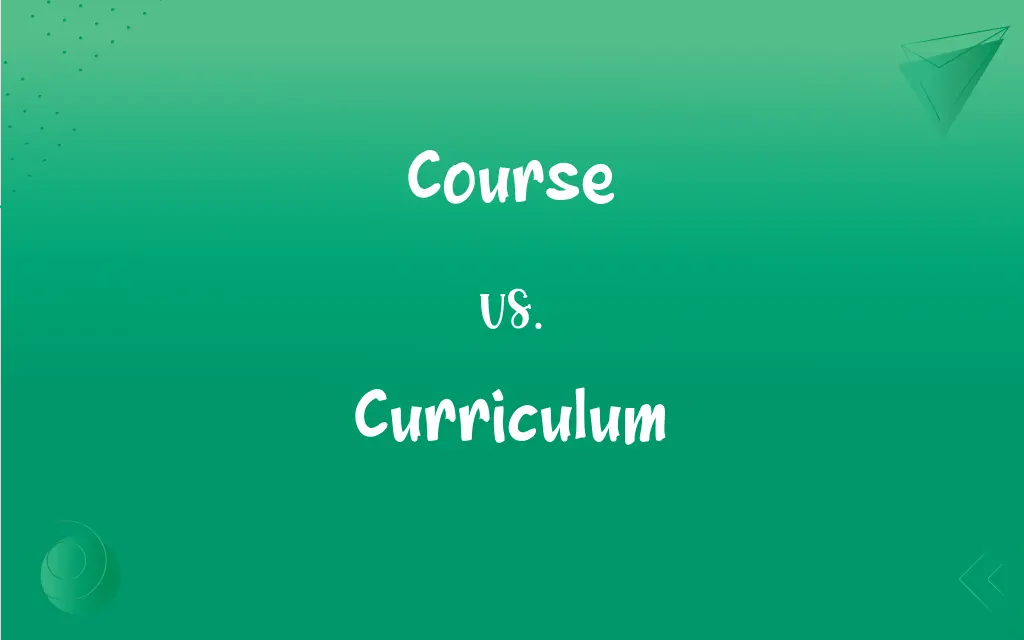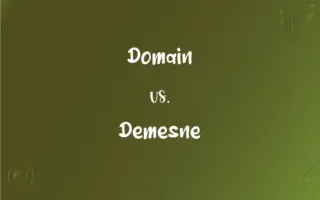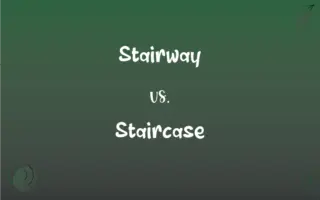Course vs. Curriculum: What's the Difference?
Edited by Aimie Carlson || By Janet White || Updated on September 18, 2023
A course is a single unit of teaching typically focused on a specific subject, while a curriculum is the overall content and structure of educational programs, encompassing multiple courses and learning objectives.

Key Differences
A Course is a single, specific educational program that focuses on a subject or a set of related subjects. It generally includes lectures, assignments, and assessments designed to impart knowledge and skills. A Curriculum, in contrast, is a comprehensive framework that encompasses multiple courses, aiming to provide a well-rounded education in a specific field or across disciplines.
While a Course is a building block in the educational journey, a Curriculum is like the blueprint of that journey. A Course could be something as simple as "Introduction to Chemistry," which might have weekly lessons, labs, and exams. On the other hand, a Curriculum in a science degree would include multiple courses in biology, chemistry, physics, and perhaps even some courses in ethics and communications.
Both terms, Course and Curriculum, can be used in varying educational contexts. For instance, high schools, colleges, and even online educational platforms offer courses. Curriculums are similarly diverse, ranging from early education plans to graduate study programs. However, you're likely to encounter multiple courses within any given curriculum.
From a grammatical standpoint, the word Course usually serves as a noun but can be used adjectivally in phrases like "course material" or "course outline." Similarly, Curriculum is generally a noun, but adjectival forms like "curricular activities" exist. In both cases, these terms serve as the focus of educational discussions, but their scale and scope differ considerably.
The success of a Course is often evaluated through grades or feedback on specific assignments and exams. A Curriculum, however, is usually assessed more holistically—looking at student outcomes, skill acquisition, and even job placement rates. Therefore, the evaluation metrics differ for a Course and a Curriculum.
ADVERTISEMENT
Comparison Chart
Scope
Single, specific program of study
Comprehensive plan covering multiple courses
Components
Lectures, assignments, assessments
Multiple courses, extracurriculars, general education
Assessment
Grades, assignments, exams
Holistic: student outcomes, skill acquisition
Grammatical Use
Mainly a noun, can be used adjectivally
Mainly a noun, can be used adjectivally
Time Duration
Often a semester or academic term
Usually spans multiple years
ADVERTISEMENT
Course and Curriculum Definitions
Course
A unit of educational instruction.
He took a Course in advanced calculus.
Curriculum
A planned set of courses in education.
The school’s Curriculum was updated this year.
Course
A path or direction.
The ship changed its Course.
Curriculum
A guide for educational policies.
The Curriculum sets the guidelines for teaching methods.
Course
A continuous layer in a building.
The Course of bricks was evenly laid.
Curriculum
A scope and sequence of learning.
The Curriculum outlined the skills to be acquired.
Course
Development in a particular way; progress
The course of events.
Curriculum
A comprehensive educational plan.
The Curriculum covered both arts and sciences.
Course
Movement in time; duration
In the course of a year.
Curriculum
A specific study program in a subject.
The Curriculum in biology was quite challenging.
Course
The direction of continuing movement
The boat took a northern course.
Curriculum
All the courses of study offered by an educational institution.
Course
The route or path taken by something that moves, such as a stream or vehicle.
Curriculum
A group of related courses, often in a special field of study
The engineering curriculum.
Course
A designated route or area on which a race is held
The course of a marathon.
Curriculum
The set of courses, coursework, and their content, offered at a school or university.
Course
See golf course.
Curriculum
(obsolete) A racecourse; a place for running.
Course
A mode of action or behavior
Followed the best course and invested her money.
Curriculum
A race course; a place for running.
Course
A typical, natural, or customary manner of proceeding or developing
A fad that ran its course.
Curriculum
A course; particularly, a specified fixed course of study, as in a university.
Course
A systematic or orderly succession; a sequence
A course of medical treatments.
Curriculum
An integrated course of academic studies;
He was admitted to a new program at the university
Course
A continuous layer of building material, such as brick or tile, on a wall or roof of a building.
Course
A complete body of prescribed studies constituting a curriculum
A four-year course in engineering.
Course
A unit of such a curriculum
Took an introductory course in chemistry.
Passed her calculus course.
Course
A part of a meal served as a unit at one time
The first course was a delicious soup.
Course
(Nautical) The lowest sail on a mast of a square-rigged ship.
Course
A point on the compass, especially the one toward which a vehicle, such as a ship, is moving.
Course
(Music) A string or set of two or more closely-spaced and usually identically-tuned strings, as on a lute.
Course
To move swiftly through or over; traverse
Ships coursing the seas.
Course
To hunt (game) with hounds.
Course
To set (hounds) to chase game.
Course
To proceed or move swiftly in a certain direction or along a course
"Big tears now coursed down her face" (Iris Murdoch).
Course
To hunt game with hounds.
Course
A sequence of events.
The normal course of events seems to be just one damned thing after another.
Course
A normal or customary sequence.
Course
A programme, a chosen manner of proceeding.
Course
Any ordered process or sequence of steps.
Course
A learning programme, whether a single class or (UK) a major area of study.
I need to take a French course.
Course
A treatment plan.
Course
A stage of a meal.
We offer seafood as the first course.
Course
The succession of one to another in office or duty; order; turn.
Course
A path that something or someone moves along.
His illness ran its course.
Course
The itinerary of a race.
The cross-country course passes the canal.
Course
A racecourse.
Course
The path taken by a flow of water; a watercourse.
Course
(sports) The trajectory of a ball, frisbee etc.
Course
(golf) A golf course.
Course
(nautical) The direction of movement of a vessel at any given moment.
The ship changed its course 15 degrees towards south.
Course
(navigation) The intended passage of voyage, such as a boat, ship, airplane, spaceship, etc.
A course was plotted to traverse the ocean.
Course
The drive usually frequented by Europeans at an Indian station.
Course
(nautical) The lowest square sail in a fully rigged mast, often named according to the mast.
Main course and mainsail are the same thing in a sailing ship.
Course
Menses.
Course
A row or file of objects.
Course
(masonry) A row of bricks or blocks.
On a building that size, two crews could only lay two courses in a day.
Course
(roofing) A row of material that forms the roofing, waterproofing or flashing system.
Course
(textiles) In weft knitting, a single row of loops connecting the loops of the preceding and following rows.
Course
(music) One or more strings on some musical instruments (such as the guitar, lute or vihuela): if multiple, then closely spaced, tuned in unison or octaves and intended to played together.
Course
To run or flow (especially of liquids and more particularly blood).
The oil coursed through the engine.
Blood pumped around the human body courses throughout all its veins and arteries.
Course
(transitive) To run through or over.
Course
(transitive) To pursue by tracking or estimating the course taken by one's prey; to follow or chase after.
Course
(transitive) To cause to chase after or pursue game.
To course greyhounds after deer
Course
The act of moving from one point to another; progress; passage.
And when we had finished our course from Tyre, we came to Ptolemais.
Course
The ground or path traversed; track; way.
The same horse also run the round course at Newmarket.
Course
Motion, considered as to its general or resultant direction or to its goal; line progress or advance.
A light by which the Argive squadron steersTheir silent course to Ilium's well known shore.
Westward the course of empire takes its way.
Course
Progress from point to point without change of direction; any part of a progress from one place to another, which is in a straight line, or on one direction; as, a ship in a long voyage makes many courses; a course measured by a surveyor between two stations; also, a progress without interruption or rest; a heat; as, one course of a race.
Course
Motion considered with reference to manner; or derly progress; procedure in a certain line of thought or action; as, the course of an argument.
The course of true love never did run smooth.
Course
Customary or established sequence of events; recurrence of events according to natural laws.
By course of nature and of law.
Day and night,Seedtime and harvest, heat and hoary frost,Shall hold their course.
Course
Method of procedure; manner or way of conducting; conduct; behavior.
My lord of York commends the plot and the general course of the action.
By perseverance in the course prescribed.
You hold your course without remorse.
Course
A series of motions or acts arranged in order; a succession of acts or practices connectedly followed; as, a course of medicine; a course of lectures on chemistry.
Course
The succession of one to another in office or duty; order; turn.
He appointed . . . the courses of the priests
Course
That part of a meal served at one time, with its accompaniments.
He [Goldsmith] wore fine clothes, gave dinners of several courses, paid court to venal beauties.
Course
A continuous level range of brick or stones of the same height throughout the face or faces of a building.
Course
The lowest sail on any mast of a square-rigged vessel; as, the fore course, main course, etc.
Course
The menses.
Course
To run, hunt, or chase after; to follow hard upon; to pursue.
We coursed him at the heels.
Course
To cause to chase after or pursue game; as, to course greyhounds after deer.
Course
To run through or over.
The bounding steed courses the dusty plain.
Course
To run as in a race, or in hunting; to pursue the sport of coursing; as, the sportsmen coursed over the flats of Lancashire.
Course
To move with speed; to race; as, the blood courses through the veins.
Course
Education imparted in a series of lessons or class meetings;
He took a course in basket weaving
Flirting is not unknown in college classes
Course
A connected series of events or actions or developments;
The government took a firm course
Historians can only point out those lines for which evidence is available
Course
Facility consisting of a circumscribed area of land or water laid out for a sport;
The course had only nine holes
The course was less than a mile
Course
A mode of action;
If you persist in that course you will surely fail
Once a nation is embarked on a course of action it becomes extremely difficult for any retraction to take place
Course
A line or route along which something travels or moves;
The hurricane demolished houses in its path
The track of an animal
The course of the river
Course
General line of orientation;
The river takes a southern course
The northeastern trend of the coast
Course
Part of a meal served at one time;
She prepared a three course meal
Course
(construction) a layer of masonry;
A course of bricks
Course
Move swiftly through or over;
Ships coursing the Atlantic
Course
Move along, of liquids;
Water flowed into the cave
The Missouri feeds into the Mississippi
Course
Hunt with hounds;
He often courses hares
Course
As might be expected;
Naturally, the lawyer sent us a huge bill
Course
A series of lectures or lessons.
The Course had 12 lectures in total.
Course
A set progression or sequence.
The medicine needs to complete its Course.
FAQs
What is a Curriculum?
A Curriculum is an organized set of educational courses and content.
Does a Curriculum include only academic courses?
No, a Curriculum can also include extracurricular activities and general education.
How is a Course assessed?
Courses are often assessed through grades, assignments, and exams.
What is a Course?
A Course is a specific program of study focused on a subject or related subjects.
Can a Course stand alone?
Yes, a Course can be standalone or part of a Curriculum.
Can you give an example of a Course?
"Introduction to Philosophy" is an example of a Course.
Can you give an example of a Curriculum?
A Bachelor's degree in Computer Science is an example of a Curriculum.
Are both terms nouns?
Primarily, yes, but they can also be used adjectivally.
Can a Curriculum change over time?
Yes, curriculums can be updated or modified.
How long does a Curriculum usually span?
A Curriculum often spans multiple years of education.
How is a Curriculum evaluated?
Curriculums are evaluated holistically, looking at student outcomes and skills.
How long does a Course typically last?
A Course often lasts a semester or an academic term.
Can both terms be used outside of education?
Yes, both can have broader meanings, like "course of action" or "curriculum vitae."
What’s the primary difference between a Course and a Curriculum?
A Course is a specific study program, while a Curriculum is a comprehensive educational plan.
Do all schools have the same Curriculum?
No, curriculums can vary greatly among schools and educational systems.
About Author
Written by
Janet WhiteJanet White has been an esteemed writer and blogger for Difference Wiki. Holding a Master's degree in Science and Medical Journalism from the prestigious Boston University, she has consistently demonstrated her expertise and passion for her field. When she's not immersed in her work, Janet relishes her time exercising, delving into a good book, and cherishing moments with friends and family.
Edited by
Aimie CarlsonAimie Carlson, holding a master's degree in English literature, is a fervent English language enthusiast. She lends her writing talents to Difference Wiki, a prominent website that specializes in comparisons, offering readers insightful analyses that both captivate and inform.































































